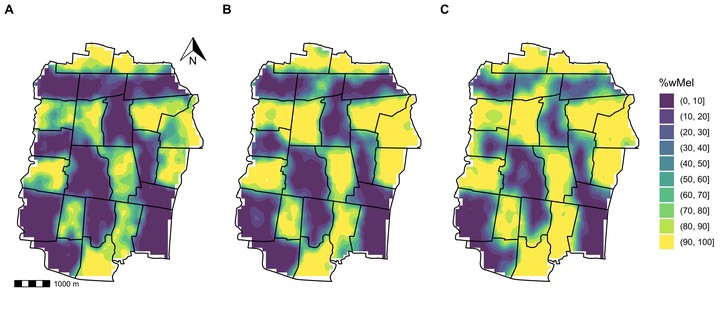Reanalysis of cluster randomized trial data to account for exposure misclassification using a per-protocol and complier-restricted approach
 Figure by: Suzanne Dufault
Figure by: Suzanne Dufault
Abstract
The intention-to-treat analysis of a cluster randomized trial of Wolbachia (wMel strain) mosquito releases for control of dengue (the Applying Wolbachia to Eliminate Dengue [AWED] trial) estimated a protective efficacy of 77.1% for participants resident in areas randomized to receive releases of w Mel-infected Aedes aegypti mosquitoes. The limiting assumptions of ITT analyses in cluster randomized trials and the mobility of both mosquitoes and humans across cluster boundaries mean that the primary analysis is likely to have underestimated the full public health benefit. Using spatially and temporally resolved data on the distribution of Wolbachia mosquitoes and on trial participants’ mobility collected during the AWED trial, this work performs a complier-restricted and per protocol re-examination of the efficacy of the Wolbachia intervention, taking explicitly into account human mobility and the uneven establishment and spillover of w Mel mosquitoes. By applying the same estimation procedures as those performed in the primary analysis, we are able to identify the impact of exposure misclassification on estimated efficacy. Increased intervention efficacy was estimated in all analyses by the refined exposure measures. The complier-restricted analysis resulted in an estimated efficacy of 80.7% (95% CI: 65.9, 89.0). The effect of the refined exposure estimation on per-protocol results was even more striking, with an estimated 82.7% (71.7, 88.4) efficacy when comparing participants with an estimated w Mel exposure of 80% or higher compared to those with 20% or lower. These reanalyses provide a case study of how human and mosquito movement can lead to underestimation of the intervention effect in trials of vector interventions, and indicate that the protective efficacy of Wolbachia is even higher than reported in the primary trial results.